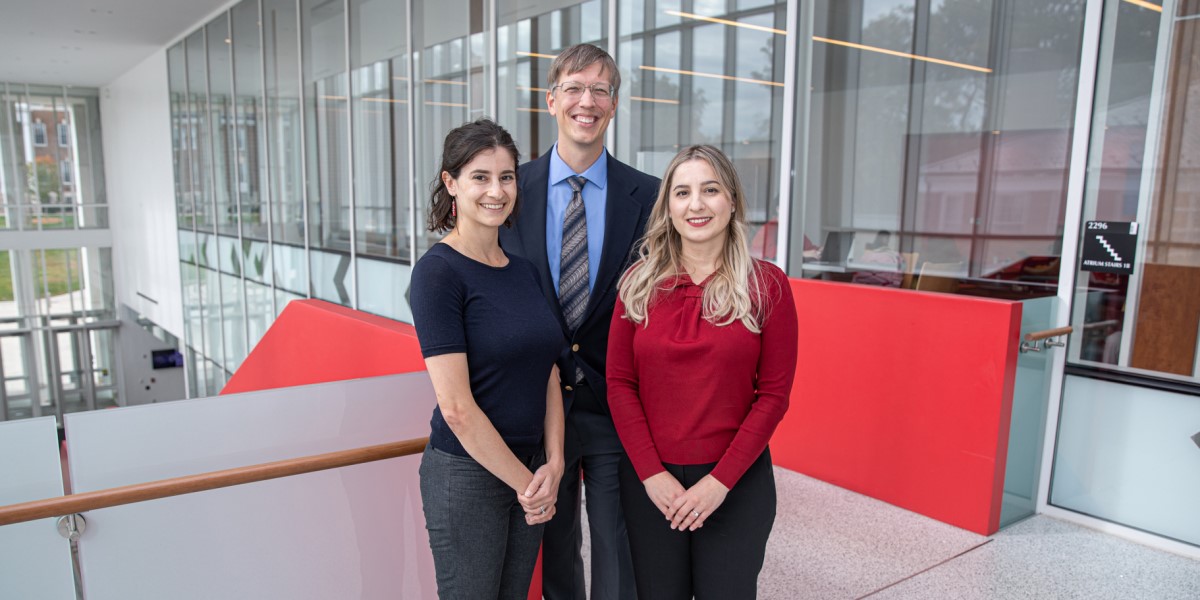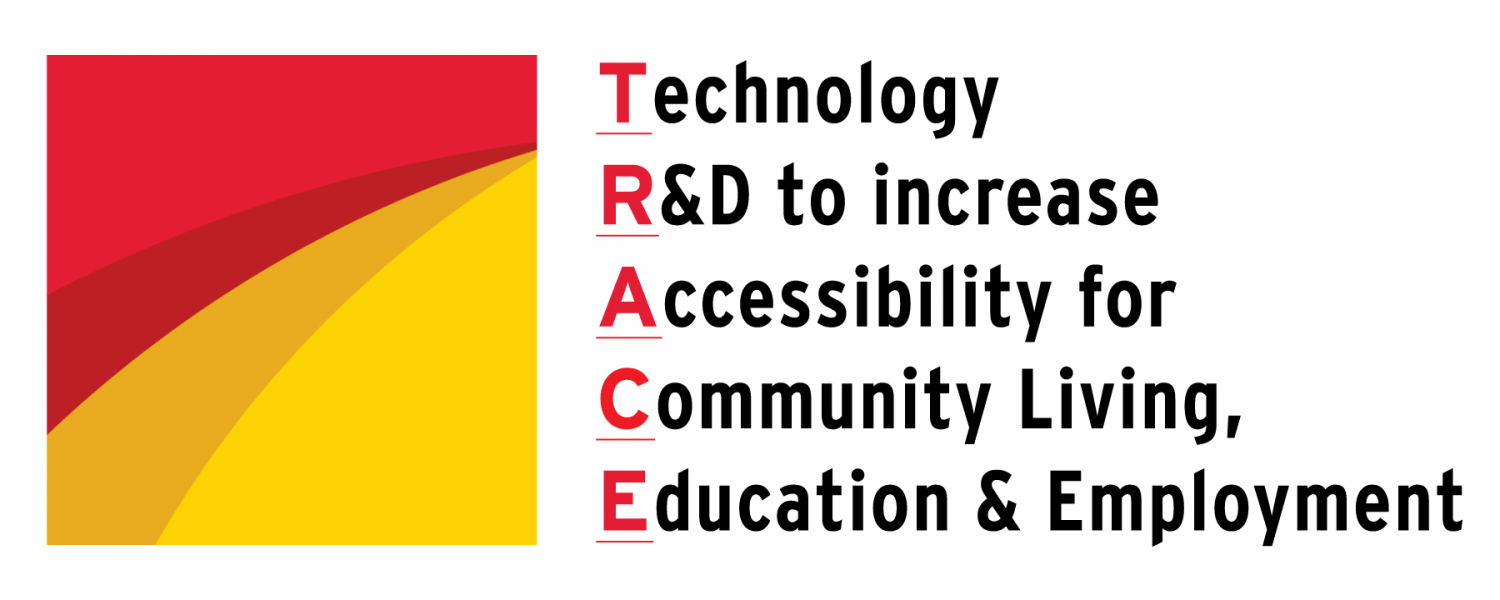Led by Drs. J. Bern Jordan, Hernisa Kacorri, and Amanda Lazar at the UMD INFO College in partnership with Raising the Floor-US

From left, Drs. Amanda Lazar, J. Bern Jordan, and Hernisa Kacorri. Photo by Craig Taylor.
For immediate release: January 23, 2024
COLLEGE PARK, MD – A dynamic team of researchers, led by Drs. J. Bern Jordan, Hernisa Kacorri, and Amanda Lazar from the University of Maryland (UMD) College of Information Studies (INFO), is the recipient of a five-year, $4.6 million Rehabilitation Engineering Research Center (RERC) grant from the National Institute on Disability, Independent Living, and Rehabilitation Research (NIDILRR), a program of the Administration for Community Living, U.S. Department of Health and Human Services (Grant 90REGE0024).
This initiative is dedicated to pioneering a multifaceted program with a central focus on expanding access to information and communication technology. The team will research and develop innovative approaches that can enhance the accessibility of a wide array of emerging and existing technologies. Their mission: to create solutions that meet the needs of people living with diverse disabilities, ultimately fostering greater inclusion across all spheres of life. The team will build upon a solid foundation laid by the previous RERCs awarded to the Trace R&D Center dating back to 1982, ensuring a seamless continuity of progress and innovation with the TRACE RERC.

“RERC grants through NIDILRR and the Administration for Community Living are a wonderful opportunity for research and development, both on the leading edge and in improving existing technology so that it can make a positive difference in the lives of people with disabilities,” says Dr. J. Bern Jordan (RERC Principal Investigator and Asst. Research Engineer). “I am excited about the potential impact of the work that our team will be doing in machine learning, often-overlooked tech barriers, cross-disability access to kiosks, photosensitive epilepsy safety, and accessibility standards and guidance.”
Dr. Hernisa Kacorri (Assoc. Professor) is leading research that centers on leveraging generative AI for accessibility, with a focus on user control and personalization. The notion that generative AI will work out of the box for accessibility is appealing, but the reality is more complex. Accessibility tasks often require a deeper understanding of context and the user. “Generative AI is transforming mainstream technologies at a faster rate than assistive technologies,” says Kacorri. “We want to believe that accessibility will follow. Until then, we have to make sure it is not leaving the disability community behind. Our mandate is clear: identify opportunities and barriers in generative AI and engineer solutions that allow people to successfully adapt emerging AI tech for their daily access needs.”
Dr. Amanda Lazar (Asst. Professor) is leading research on the critical gap between mainstream technologies and older adults who are facing barriers using these technologies. Consumer-facing technologies are often designed to be operable “out of the box,” but not everyone can figure out what actions are possible and how the technology is meant to be used. “We tend to treat the technical support older adults ask for as a nuisance. We don’t think very hard about issues such as needing to reconnect to Wi-Fi but not knowing how to, or knowing where to go to initiate a Zoom call,” says Lazar. “I am excited to have the opportunity to look closely at the ways technologies are not working well and to draw out the hidden forms of knowledge everyday technologies require for successful use. These findings will be used to generate and prototype best practices for design, technology support, and personalization.”
In addition to research, RERCs emphasize development projects that result in technology transfer or system change (e.g., through industry standards or government regulation). J. Bern Jordan is leading the TRACE RERC development projects in partnership with Christopher Walker (CTO and lead software engineer) and others at Raising the Floor-US, a non-profit organization focused on accessibility technology.
Past Trace Center RERCs have had great success developing techniques for making kiosks and other self-service transaction machines (SSTMs) accessible. Such systems are being deployed more widely today. As Jordan explains, “Our current access strategies work well on large touchscreen kiosks but may be less likely to be implemented on many of today’s smaller devices.” The RERC team will work with end users with a variety of disabilities, kiosk and software vendors, and companies and organizations that deploy kiosks. Open strategies and software techniques will be developed to make it easier for inclusion on a variety of devices.
Another development project will be creating new open-source tools for screening videos and other content for flashes and flicker that might be hazardous to people with photosensitive epilepsy. In prior Trace Center RERCs, the popular PEAT (Photosensitive Epilepsy Analysis Tool) software was created to determine whether videos, animations, games, and other content on websites with intense flashing or bold, regular patterns, would trigger seizures in people with photosensitive epilepsy. As technology has advanced, the existing PEAT engine and analysis tool faces challenges, and a replacement is needed that aligns with new technologies. “Among technology, gaming, and other companies, there is increasing interest in producing safe content and screening for hazards. Unfortunately, there are currently no open-source tools that companies can pick up and use in their own tools and workflows,” says Jordan.
“The RERC will convert research into commercial-quality, open-source software which can be delivered directly to kiosk and content creators, and which can also be adopted and modified by others,” says Walker. “Kiosk hardware and software developers will be able to adapt the findings and code into solutions which break down interaction barriers for people with disabilities. Content creators will be able to use the new open-source PEAT to analyze broadcast and online media prior to publishing, helping ensure that all media is accessible to those with photosensitive epilepsy.”
The RERC has deep expertise in technology, strategies, and standards towards eliminating barriers to people with disabilities. An important activity of the TRACE RERC will be to support organizations, companies, government agencies, and other centers with the information they need as they aim for more universal access to information and communication technology. Interest in accessibility is increasing as evidenced by several recent examples of U.S. rulemaking on accessibility standards for SSTMs, accessibility of websites for ADA Title II entities, and accessibility in health care and human services programs. The RERC will contribute to rulemaking processes and standardization efforts in the U.S. and internationally. “I am delighted to see the direction and projects of this new RERC and its new leadership. It combines projects that move existing research from the university and elsewhere into real products and tools that can impact the lives of people with disabilities today, along with exciting new research that will help lay the groundwork for the next generation of solutions,” says Prof. Gregg Vanderheiden, who led the RERC in the past and will be retiring next year as he finishes up the last RERC.
The TRACE RERC is partnering with the new Maryland Initiative for Digital Accessibility, contributing to MIDA’s goal of developing technology projects to improve accessibility and demonstrate the born-accessible approach to design. By researching and developing new accessibility solutions, bridging gaps between technologies and users, and advocating for change, the TRACE RERC is helping to create a more inclusive and accessible world for all.
If you would like to connect with the TRACE RERC team to discuss partnering, please email trace-info@umd.edu, For updates about the projects, please visit the TRACE RERC website or LinkedIn page.
Media Contact: Dr. J. Bern Jordan, jbjordan@umd.edu, 301-405-5413 (email preferred).
# # #
ABOUT THE UMD COLLEGE OF INFORMATION STUDIES
Founded in 1965, the University of Maryland (UMD) College of Information Studies (INFO) is a leading research and teaching college in the field of information science, ranked #4 in the USA by the U.S. News & World Report. INFO faculty, staff, and students are expanding the frontiers of how people access and use information and technology in an evolving world—in government, education, business, social media, and more. The college offers top-ranked academic degree programs and leads cutting-edge academic and industry research, specializing in library and information science, digital curation, data systems and management, human-computer interaction, accessible and inclusive technology design, health information technology design, sociotechnical systems, and cybersecurity and privacy. Located just outside of Washington, D.C., INFO faculty, staff, and students have unmatched research, internship, and career opportunities.